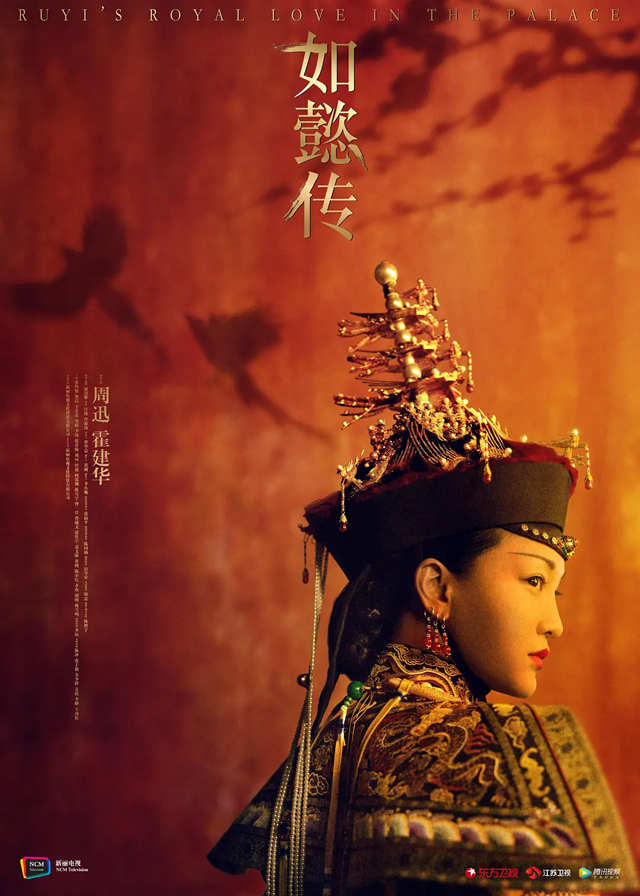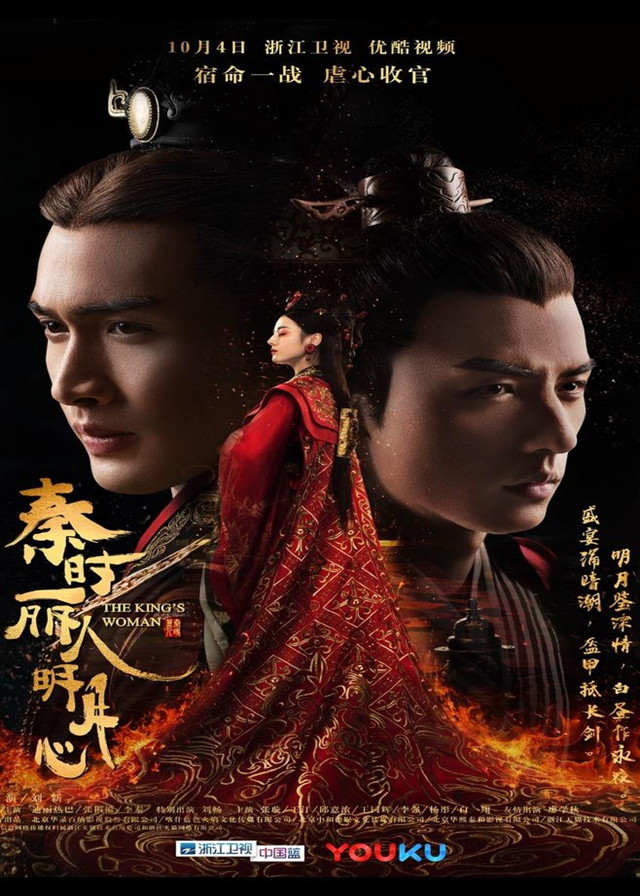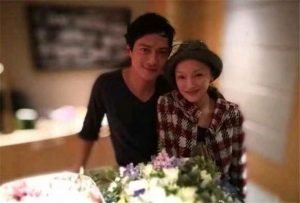Ruyi's Royal Love in the Palace Episode 52 Recap
> Ruyi's Royal Love in the Palace Recap
- 1
- 2
- 3
- 4
- 5
- 6
- 7
- 8
- 9
- 10
- 11
- 12
- 13
- 14
- 15
- 16
- 17
- 18
- 19
- 20
- 21
- 22
- 23
- 24
- 25
- 26
- 27
- 28
- 29
- 30
- 31
- 32
- 33
- 34
- 35
- 36
- 37
- 38
- 39
- 40
- 41
- 42
- 43
- 44
- 45
- 46
- 47
- 48
- 49
- 50
- 51
- 52
- 53
- 54
- 55
- 56
- 57
- 58
- 59
- 60
- 61
- 62
- 63
- 64
- 65
- 66
- 67
- 68
- 69
- 70
- 71
- 72
- 73
- 74
- 75
- 76
- 77
- 78
- 79
- 80
- 81
- 82
- 83
- 84
- 85
- 86
- 87
The Emperor tasked Ruyi with executing Imperial Concubine Mei. Ruyi arrived at Mei's palace to find her in formal attire, playing a "phoenix-neck" pipa. Mei revealed that the pipa was a gift from the Late Emperor, a cherished possession, but lamented that she had ultimately "played the wrong tune" in life. Ruyi asked why she had harmed Imperial Concubine Qing. Mei confessed that she, Imperial Concubine Qing, and Consort Shu were all planted by the Empress Dowager.
However, she explained that it was the Emperor himself who instructed her to poison Imperial Concubine Qing, aiming to make the Empress Dowager suffer a loss she couldn't openly complain about, forcing her to blame herself for choosing the wrong people to be by the Emperor's side. Mei's only regret in life was her child, whose death she believed she had avenged, though she never even saw his face.
She recounted that Moxin had approached her, revealing the truth behind her child's death and identifying Empress Xiaoxian as the culprit. Ruyi expressed her skepticism, finding the entire incident suspicious. She argued that Empress Xiaoxian, securely in her position with an adult legitimate heir, had no reason to feel threatened by Mei's child. Furthermore, Ruyi didn't believe Mei could have single-handedly poisoned Empress Xiaoxian and the Seventh Prince.
She revealed that Imperial Physician Jiang had found an unusual poison in Mei's food and questioned why Noble Consort Jia was so intent on killing Mei. Ruyi suggested that someone had merely used Mei and was now attempting to silence her. Distraught by the possibility that she had hated and avenged the wrong person, Mei tearfully confessed her deep longing for her child and her fear of not recognizing him in the afterlife.
Ruyi comforted her, assuring Mei that she had arranged an auspicious burial site for both her and her child, and promised to perform a ceremony for them, hoping for their reunion in the netherworld. Grateful, Mei asked for a dignified death to meet her child proudly. Ruyi had poison wine brought to her.
Mei drank it, embraced her pipa, and with a tender smile, whispered to her child that she was coming, affirming her unending love for him, before peacefully passing away. Ruyi left the palace, feeling a profound pity for Imperial Concubine Mei, who had sought revenge in such an obscured manner and might never know the true culprit.
She continued to suspect Noble Consort Jia's involvement in Mei's attempted murder and other palace intrigues, acknowledging that Noble Consort Jia's schemes were deep and would require irrefutable evidence to convince the Emperor. News of Imperial Concubine Mei's death was publicly attributed to cholera, and she received no imperial title, funeral, or burial in the imperial mausoleum, her body unceremoniously cremated. Shortly after, Consort Shu gave birth to a prince, the Tenth Prince.
However, the Emperor was not entirely joyful, troubled by the Imperial Astronomer's prediction that he and the Tenth Prince were fated to be nemeses. Meanwhile, the Empress Dowager visited Consort Shu, doting on the healthy-looking Tenth Prince and offering precious gifts, including thousand-year-old purple ginseng, and lavishly rewarding the midwives and imperial physicians. In a secret meeting with Consort Ling (Yanwan), Grandmother Tian, one of the midwives, confirmed that her task was meticulously completed without a trace.
Consort Ling (Yanwan) blackmailed Grandmother Tian with knowledge of her hidden daughter and a family illness, offering a life-saving prescription in exchange for her silence and cooperation. Grandmother Tian assured Consort Ling (Yanwan) that despite the prince's safe birth, Consort Shu's prior kidney issues during pregnancy made it highly unlikely for the Tenth Prince to be raised to adulthood.
A month later, Imperial Physician Jiang reported that the Tenth Prince exhibited clear signs of congenital qi and blood loss, a condition stemming from Consort Shu's weak kidneys during pregnancy. The Emperor, connecting this to the Imperial Astronomer's prediction, became convinced that he was unwittingly harming his son. Ruyi tried to reassure him, urging him not to place full faith in celestial predictions and to trust the imperial physicians.
However, Consort Ling (Yanwan) opportunistically approached the Emperor, feigning concern for his recent fatigue and subtly reinforcing his fears. She suggested that if the Empress Dowager were to raise the Tenth Prince, as she had desired, it would further validate the "father-son ill-fated" prophecy. Swayed by these manipulations, the Emperor decided to send the Tenth Prince away. Despite Consort Shu's desperate pleas and the Empress Dowager's offer to care for the infant, the Emperor remained resolute.
He cited historical precedents of weak imperial heirs being raised outside the palace for their health, and influenced by his own recent dizzy spells and fatigue, insisted on believing the prophecy. To "sever" the perceived ill fate, he ordered Prince Xian to adopt the Tenth Prince as his foster son, to be named "Nafu," with the intention of returning him to the palace when he was older.
The Empress Dowager, witnessing the Emperor's conviction and apparent ill health, reluctantly agreed, privately worrying about the implications of keeping such a weak child herself. The Yellow River suffered a major flood, plunging the Emperor into deep worry and affecting his health. He reinstated Gao Bin to manage the disaster.
Consort Shu, despite sending him snow-pear soup, lamented to Ruyi that she had not been summoned by the Emperor for over a hundred days since childbirth, fearing it was due to her facial spots or some unknown apprehension. She also desperately missed the Tenth Prince, who had been away for two months, but Ruyi informed her that the Emperor had strictly forbidden visits except during holidays.
Ruyi later confided in Rongpei that the Emperor avoided Consort Shu due to guilt over her weakened health from the conception prescriptions, which led to the Tenth Prince's congenital illness, combined with the astronomer's prophecy. That night, the Emperor woke from a nightmare, seeing his Late Imperial Father suddenly pass away. He connected his own mounting fatigue and the Tenth Prince's weakness to the "ill-fated" prophecy, wondering if he too was destined for a similar sudden end.
Ruyi gently reminded him that the Tenth Prince was no longer in the palace and encouraged him not to dwell on such distressing thoughts. The Emperor then asked Ruyi if he was growing old, to which she tenderly replied that aging was a natural process and promised to accompany him through it.
The next morning, Ruyi inquired about the Emperor's health with Li Yu, who reassured her that the Emperor maintained a disciplined regimen of exercise and restorative foods, though he had recently developed a craving for venison to boost his yang energy due to feeling weak. Ruyi then gathered the concubines, announcing upcoming prayers for the Emperor and the Tenth Prince, and a special ritual for Imperial Concubine Mei, who had not received a proper funeral.
Imperial Concubine Qing, still resentful, questioned why Mei, a "vicious woman," deserved such a ceremony. Ruyi argued that Mei had already been punished and her actions "may not have been her true intention," driven by suffering. Noble Consort Jia, feigning curiosity, insinuated that Mei must have revealed something to Ruyi to soften her stance. Ruyi confirmed that Mei had indeed shared heartfelt sentiments before her death, admitting to harming Imperial Concubine Qing out of the "pain of losing a child."
Mei also expressed pity for the children in the palace, including her own, Imperial Concubine Yi's, and Empress Xiaoxian's Seventh Prince, whose "unjust deaths" remained unsolved. The other concubines interjected, stating that the Seventh Prince had died of smallpox. Ruyi, however, highlighted the suspicious nature of his death: while smallpox was widespread, Changchun Palace had been meticulously guarded, and the Seventh Prince's wet nurse had never left the palace.
She then revealed Mei's account of meeting Moxin, Imperial Noble Consort Huixian's maid, who later died of smallpox, yet Mei remained unharmed, while the Seventh Prince and his wet nurse tragically succumbed. Noble Consort Jia dismissed these concerns, attributing the Seventh Prince's death to an "unblessed" fate.
Consort Ling (Yanwan) and other concubines immediately condemned Noble Consort Jia's words as disrespectful to Empress Xiaoxian and the Seventh Prince, with Consort Ling (Yanwan) quoting, "A man must first despise himself, and then others will despise him." Upholding palace rules, Ruyi confined Noble Consort Jia to Qixiang Palace and ordered her to inscribe one hundred Tibetan prayer flags for Empress Xiaoxian and the Seventh Prince as an act of repentance.
When Noble Consort Jia protested and threatened to appeal to the Emperor, she was sternly reminded by other concubines that the Empress had full authority over harem matters. Ruyi assured Noble Consort Jia that she would indeed inform the Emperor of her conduct. Later, Ruyi explained to the Emperor her suspicions about Noble Consort Jia's involvement in the deaths of Empress Xiaoxian and her son, citing past clues such as Yonghuang's deathbed remarks and Noble Consort Jia poisoning Mei's parrot.
However, the Emperor, citing lack of concrete evidence and the political influence of the Yu Clan, stated he could not act on mere suspicion. Ruyi then insisted that Noble Consort Jia should prick her fingers and use her blood to inscribe the mantras for a truly devoted repentance, to which the Emperor agreed. Meanwhile, in Qixiang Palace, Noble Consort Jia, despite her punishment, defiantly scoffed at Empress Xiaoxian's perceived weakness and secretly plotted her next move against the Empress.












